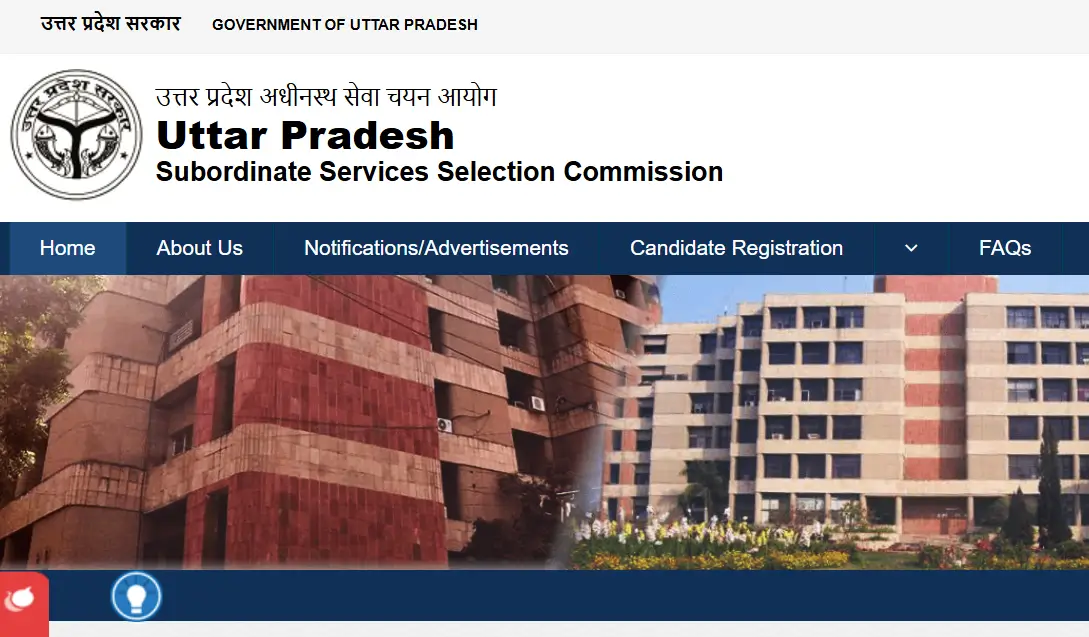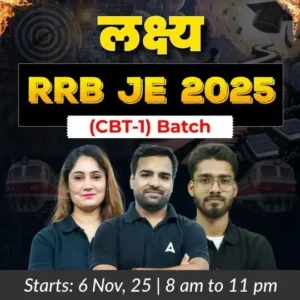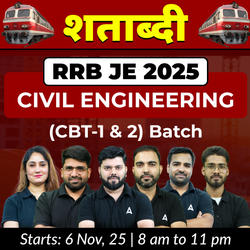The Uttar Pradesh Subordinate Services Selection Commission (UPSSSC) has released the UPSSSC JE Syllabus 2025 PDF for Junior Engineer Posts. All those candidates who successfully registered for the UPSSSC JE 2025 exam must go through the syllabus and exam pattern to understand the topic-wise questions, number of sections, and marking scheme. Knowing the UPSSSC syllabus acts as a roadmap for your preparation.
UPSSSC JE Syllabus and Exam Pattern 2025
This syllabus outlines topics for each subject, helping candidates understand which areas will be more important in the exam and require more preparation time. The written exam is conducted at the state level and consists of 100 multiple-choice questions. It is held offline in both Hindi and English languages. It’s important to note that there is a penalty of 0.25 marks deducted for every incorrect answer, so candidates should answer carefully.
| UPSSSC JE Syllabus and Exam Pattern 2025 – Highlights | |
| Organization | Uttar Pradesh Subordinate Services Selection Commission (UPSSSC) |
| Exam Name | UPSSSC JE 2025 |
| Post Name | Junior Engineer (JE) |
| Vacancies | 4612 |
| Level of Exam | State Level |
| Exam Mode | Offline |
| Exam Language | Hindi and English |
| Number of Questions | 100 questions |
| Total Marks | 100 marks |
| Negative Marking | 0.25 Marks |
| Official Website | www.upsssc.gov.in |
UPSSSC JE Selection Process 2025
The selection process for UPSSSC JE Recruitment 2025 for Junior Engineer posts consists of two stages: a written exam followed by an interview. Only candidates who pass the written exam will proceed to the interview stage. It’s essential for candidates to successfully clear both stages of the selection process to be considered for the UPSSSC JE positions.
- Written Exam
- Interview
UPSSSC JE Exam Pattern 2025
Before candidates start preparing, it is important they understand the structure of the UPSSSC Junior Engineer exam, including its duration, scoring system, and question format. The exam primarily comprises objective-type questions. The exam is divided into 3 parts. The exam consists of 100 multiple-choice questions for a total of 100 marks. The time duration for the exam will be 02 hours (120 minutes). There is a negative marking of 1/4 mark will be deducted for a wrong answer.
| Part | Subject | Number of Questions | Total Marks |
| Part 1 (Subject related Knowledge) |
Strength of Materials & Theory of Structures
|
05 | 05 |
|
Design of Reinforced Concrete Structures
|
10 | 10 | |
|
Steel & Machinery Structures
|
05 | 05 | |
|
Estimation, Costing &
Valuation
|
05 | 05 | |
|
Soil Mechanics and
Foundation Engineering
|
05 | 05 | |
| Surveying | 05 | 05 | |
|
Transportation Engineering
|
05 | 05 | |
|
Environment and Public Health Engineering
|
05 | 05 | |
|
Building Materials and Construction
|
10 | 10 | |
| Irrigation Engineering | 05 | 05 | |
| Fluid Mechanics | 05 | 05 | |
| Part 2 |
Knowledge of concepts of Computer and Information Technology and contemporary technological development and innovation in this field
|
15 | 15 |
| Part 3 |
General information related to the state of Uttar Pradesh
|
20 | 20 |
|
Total
|
100 | 100 | |
UPSSSC JE Syllabus 2025
The UPSSSC JE Syllabus 2025 for the written exam is divided into two papers. Paper 1 covers general Hindi and English, general intelligence and reasoning, general knowledge, and computer knowledge/awareness. This paper assesses candidates on their proficiency in languages, reasoning abilities, general awareness, and basic computer knowledge relevant to the job. Paper 2 focuses specifically on the candidate’s chosen engineering discipline, evaluating their understanding and expertise in the technical aspects related to the junior engineer role. This section is crucial as it directly tests the practical knowledge and skills required for the job.
UPSSSC JE Syllabus (Part 1)
Candidates preparing for the UPSSSC JE written exam should understand that Paper 1 covers various subjects and topics. It’s important for them to thoroughly study the complete list of topics specified for Paper 1 of the exam. Strategic preparation focusing on each topic will significantly enhance their chances of achieving a good score in this section of the exam.
Strength of Materials & Theory of Structures
Effect of a force, tension and compression, free body diagram, virtual work, force distribution system. Principle of energy, force conservation of energy and momentum, rotation of rigid bodies about a fixed axis, mass moment of inertia. Stresses and strains, types of stresses and strains, definition of tension, simple compression, shear, bending, torsion, volumetric and lateral strain, Poisson’s ratio, Hooke’s law. Bending moment and shear force, types of beam, simply supported, cantilever, fixed, overhanging and continuous beams. Analysis of trusses, slope and deflection of beams. Long columns, short columns & struts, slenderness ratio. Torsion in circular shaft, combined bending, torsion and axial thrust, strength of hollow and solid shaft.
Design of Reinforced Concrete Structures
Design based on working stress method, flexural strength, shear strength and bond strength of a singly reinforced RCC beam, T-beams. Simply supported and cantilever beams, determinate and indeterminate structures, design of lintels, design of a cantilever beam and slab, design of doubly reinforced concrete beam. Design of RCC slab, design of one way and two-way slab, stair cases. Design of reinforced brick beams, slab & lintels, design of T-beams. Design of columns and column footings, cantilever retaining walls, components of overhead water tank and multistoried framed structures. Introduction to design based on limit state method. Prestressed concrete.
Tension and compression members in steel. Design of steel beams. Design of simple columns & bases. Design of simple trusses, purlins, plates and girder.
UPSSSC JE Syllabus (Part 2)
Paper 2 of the UPSSSC Junior Engineer exam will include 15 questions related to Knowledge of Concepts of Computer and Information Technology and Contemporary Technological Development and Innovation in this field. Candidates can find the detailed syllabus for UPSSSC Junior Engineer Paper 2 below.
-
History, Introduction, and Application of Computer, Information Technology, Internet and World Wide Web (WWW).
-
Digital Financial Tools and Applications.
-
Future Skills and Cyber Security.
-
Technological Development and Innovation in the field of Computer and Information Technology (Artificial Intelligence, Big Data Processing, Deep Learning, Machine Learning, Internet of Things) and India’s achievements in this field etc.
-
General Knowledge related to:1 Hardware and Software.2 Input and Output.3 Internet Protocol/IP Address.4 IT gadgets and their application.5 Creation of e-mail ID and use/operation of e-mail.6 Operation of Printer, Tablet and Mobile.7 Important elements of Word Processing (MS-Word) and Excel Processing (MS-Excel).8 Operating System, Social Networking, e-Governance.



 BPSC TRE 4.0 Syllabus 2026 and Exam Patt...
BPSC TRE 4.0 Syllabus 2026 and Exam Patt...
 SSC Selection Post Phase 14 Syllabus and...
SSC Selection Post Phase 14 Syllabus and...
 RPF SI Syllabus 2026 and Exam Pattern, S...
RPF SI Syllabus 2026 and Exam Pattern, S...









